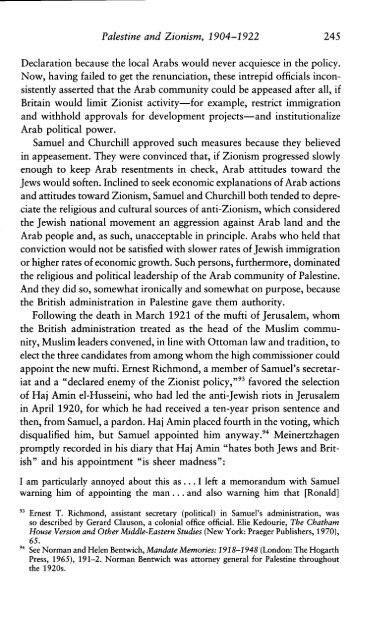Churchill, Palestine and Zionism, 1904-1922 - Douglas J. Feith
Churchill, Palestine and Zionism, 1904-1922 - Douglas J. Feith
Churchill, Palestine and Zionism, 1904-1922 - Douglas J. Feith
You also want an ePaper? Increase the reach of your titles
YUMPU automatically turns print PDFs into web optimized ePapers that Google loves.
<strong>Palestine</strong> <strong>and</strong> <strong>Zionism</strong>, <strong>1904</strong>-<strong>1922</strong> 245<br />
Declaration because the local Arabs would never acquiesce in the policy.<br />
Now, having failed to get the renunciation, these intrepid officials inconsistently<br />
asserted that the Arab community could be appeased after all, if<br />
Britain would limit Zionist activity-for example, restrict immigration<br />
<strong>and</strong> withhold approvals for development projects-<strong>and</strong> institutionalize<br />
Arab political power.<br />
Samuel <strong>and</strong> <strong>Churchill</strong> approved such measures because they believed<br />
in appeasement. They were convinced that, if <strong>Zionism</strong> progressed slowly<br />
enough to keep Arab resentments in check, Arab attitudes toward the<br />
Jews would soften. Inclined to seek economic explanations of Arab actions<br />
<strong>and</strong> attitudes toward <strong>Zionism</strong>, Samuel <strong>and</strong> <strong>Churchill</strong> both tended to depreciate<br />
the religious <strong>and</strong> cultural sources of anti-<strong>Zionism</strong>, which considered<br />
the Jewish national movement an aggression against Arab l<strong>and</strong> <strong>and</strong> the<br />
Arab people <strong>and</strong>, as such, unacceptable in principle. Arabs who held that<br />
conviction would not be satisfied with slower rates of Jewish immigration<br />
or higher rates of economic growth. Such persons, furthermore, dominated<br />
the religious <strong>and</strong> political leadership of the Arab community of <strong>Palestine</strong>.<br />
And they did so, somewhat ironically <strong>and</strong> somewhat on purpose, because<br />
the British administration in <strong>Palestine</strong> gave them authority.<br />
Following the death in March 1921 of the mufti of Jerusalem, whom<br />
the British administration treated as the head of the Muslim community,<br />
Muslim leaders convened, in line with Ottoman law <strong>and</strong> tradition, to<br />
elect the three c<strong>and</strong>idates from among whom the high commissioner could<br />
appoint the new mufti. Ernest Richmond, a member of Samuel's secretariat<br />
<strong>and</strong> a "declared enemy of the Zionist policy,"93 favored the selection<br />
of Haj Amin el-Husseini, who had led the anti-Jewish riots in Jerusalem<br />
in April 1920, for which he had received a ten-year prison sentence <strong>and</strong><br />
then, from Samuel, a pardon. Haj Amin placed fourth in the voting, which<br />
disqualified him, but Samuel appointed him anyway.94 Meinertzhagen<br />
promptly recorded in his diary that Haj Amin "hates both Jews <strong>and</strong> British"<br />
<strong>and</strong> his appointment "is sheer madness":<br />
I am particularly annoyed about this as ... I left a memor<strong>and</strong>um with Samuel<br />
warning him of appointing the man ... <strong>and</strong> also warning him that [Ronald]<br />
93 Ernest T. Richmond, assistant secretary (political) in Samuel's administration, was<br />
so described by Gerard Clauson, a colonial office official. Elie Kedourie, The Chatham<br />
House Version <strong>and</strong> Other Middle-Eastern Studies (New York: Praeger Publishers, 1970),<br />
65.<br />
94 See Norman <strong>and</strong> Helen Bentwich, M<strong>and</strong>ate Memories: 1918-1948 (London: The Hogarth<br />
Press, 1965), 191-2. Norman Bentwich was attorney general for <strong>Palestine</strong> throughout<br />
the 1920s.


